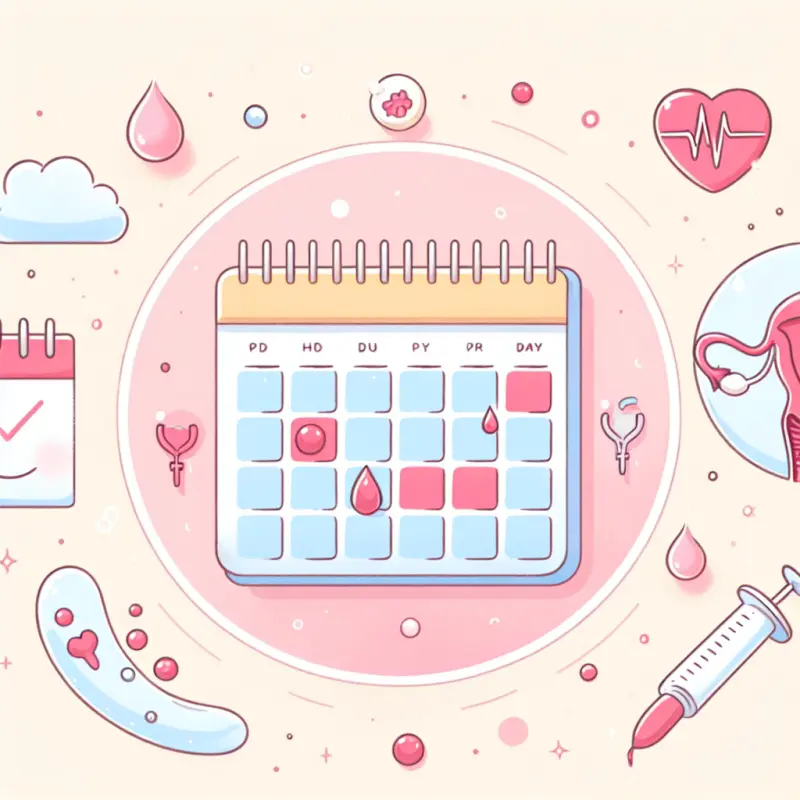How Menstruation Affects Sexual Health and Desire

How Menstruation Affects Sexual Health and Desire
Introduction
Menstruation, commonly referred to as a period, is a natural biological process experienced by half of the global population. It signifies the reproductive readiness of the body and involves a complex interplay of hormones. Despite its universal nature, menstruation is often shrouded in mystery and stigma, especially when it comes to its impact on sexual health and desire. This article aims to demystify the relationship between menstruation and sexual health, exploring how hormonal changes during the menstrual cycle can influence libido, sexual function, and overall sexual well-being.
Understanding the Menstrual Cycle
Before delving into the specifics of how menstruation affects sexual health, it's essential to understand the menstrual cycle itself. The menstrual cycle is a series of changes a woman's body undergoes to prepare for a potential pregnancy. It typically lasts between 21 to 35 days, with most cycles averaging around 28 days.
Phases of the Menstrual Cycle
-
Menstrual Phase (Days 1-5):
- The cycle begins with menstruation, where the uterine lining is shed.
- Hormone levels (estrogen and progesterone) are at their lowest.
- Common symptoms include cramps, fatigue, and mood swings.
-
Follicular Phase (Days 6-14):
- The body begins to prepare for ovulation.
- Estrogen levels rise, leading to the thickening of the uterine lining.
- Follicle-stimulating hormone (FSH) promotes the growth of ovarian follicles.
-
Ovulation (Day 14):
- A mature egg is released from the ovary.
- Estrogen peaks, and luteinizing hormone (LH) surges.
- This is the most fertile period, with increased sexual desire for many.
-
Luteal Phase (Days 15-28):
- The ruptured follicle forms the corpus luteum, which secretes progesterone.
- Progesterone prepares the uterus for a potential pregnancy.
- If no pregnancy occurs, hormone levels drop, leading to menstruation.
How Menstruation Affects Sexual Desire
Sexual desire, or libido, is a dynamic phenomenon influenced by numerous factors, including hormonal changes, psychological state, and relationship dynamics. During the menstrual cycle, fluctuations in hormone levels can have a significant impact on sexual desire.
Hormonal Influences on Libido
-
Estrogen:
- Often referred to as the "feminine hormone," estrogen plays a crucial role in sexual desire. It is highest during the follicular phase and just before ovulation, correlating with increased libido for many women.
-
Testosterone:
- Although commonly associated with male sexuality, testosterone is present in females and contributes to sexual desire. Peaks in testosterone around ovulation may boost libido.
-
Progesterone:
- High levels during the luteal phase may have a dampening effect on sexual desire, as progesterone is associated with preparing the body for pregnancy, rather than seeking new opportunities for conception.
Psychological and Emotional Factors
-
Mood Swings and Emotional State:
- The hormonal rollercoaster can lead to mood swings, anxiety, or depression, which can, in turn, affect sexual desire. A supportive environment and understanding partner can mitigate these effects.
-
Body Image and Self-Perception:
- Bloating, acne, and other physical changes during menstruation can impact self-esteem and body image, influencing sexual confidence and desire.
Menstruation and Sexual Function
Sexual function encompasses various aspects of sexual activity, including arousal, lubrication, and orgasm. Menstruation can affect these functions in several ways.
Physical and Physiological Changes
-
Vaginal Lubrication:
- Estrogen levels influence vaginal lubrication. Increased estrogen during the follicular phase enhances lubrication, while reduced levels during menstruation can lead to dryness.
-
Sensitivity and Arousal:
- Changes in blood flow during the cycle can alter genital sensitivity. Some women report heightened arousal and sensitivity around ovulation.
-
Menstrual Pain:
- Cramps, headaches, and other menstrual symptoms can detract from sexual pleasure and make intercourse uncomfortable.
The Role of Menstrual Blood
-
Cultural and Personal Attitudes:
- Cultural taboos and personal preferences play a significant role in sexual activity during menstruation. While some view menstrual sex as messy or undesirable, others find it liberating and pleasurable due to increased lubrication and sensitivity.
-
Health Considerations:
- Engaging in sexual activity during menstruation poses no inherent health risks, but it may increase the risk of infection if proper hygiene is not maintained.
Menstrual Cycle Awareness and Sexual Health
Understanding one's menstrual cycle can empower individuals to make informed decisions about their sexual health and enhance their sexual experiences.
Tracking the Cycle
-
Benefits of Cycle Tracking:
- Tracking the menstrual cycle helps in predicting periods of increased libido, managing symptoms, and optimizing sexual encounters.
-
Methods of Tracking:
- Numerous apps and tools are available for cycle tracking, which can provide insights into hormonal patterns and predict ovulation.
Communication with Partners
-
Open Communication:
- Discussing menstrual-related changes with a partner can enhance mutual understanding and improve sexual satisfaction. It also fosters a supportive environment that respects individual comfort levels.
-
Setting Boundaries:
- Understanding and respecting personal and partner boundaries regarding sexual activity during menstruation is crucial for a healthy sexual relationship.
Conclusion
Menstruation is a natural and integral aspect of female sexual health that significantly impacts sexual desire and function. By understanding the hormonal, physical, and emotional changes that occur throughout the menstrual cycle, individuals can make informed choices, communicate openly with partners, and embrace their sexual well-being with greater confidence. Awareness and acceptance of these cyclical changes can help reduce stigma, improve self-esteem, and foster healthier, more satisfying sexual relationships. If you have concerns or questions about how menstruation affects your sexual health, consider speaking with a healthcare provider for personalized guidance and support.